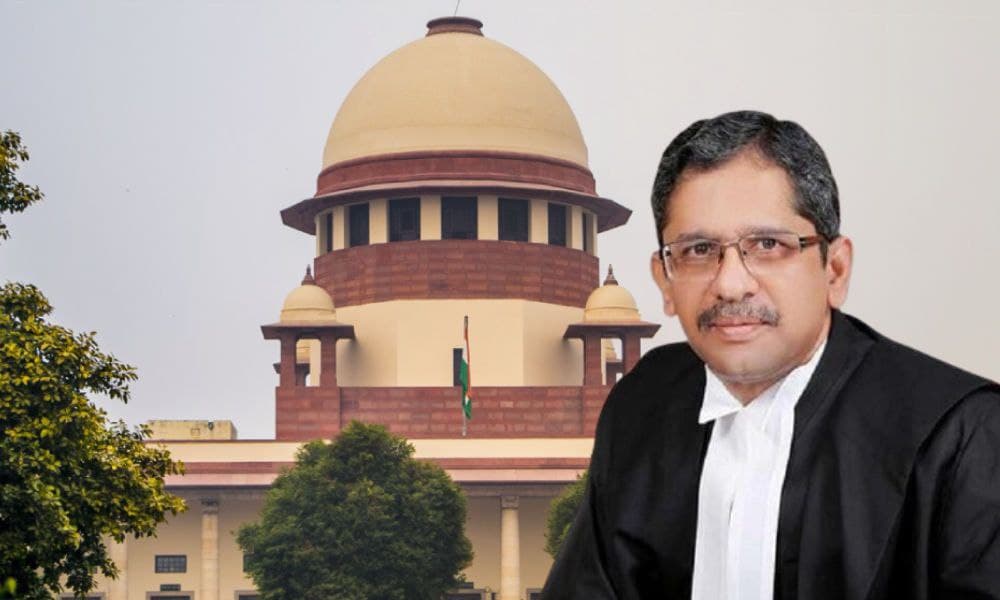
Image Credit: Wikimedia, The Indian Express
'Threat To Human Rights Are Highest In Police Stations', Remarks CJI Ramana; Points Out At Custodial Torture, Police Atrocities
Writer: Madhusree Goswami
A mountain girl trying to make it big in the city. She loves to travel and explore and hence keen on doing on-ground stories. Giving the crux of the matter through her editing skills is her way to pay back the journalism its due credit.
India, 9 Aug 2021 10:09 AM GMT
Editor : Ankita Singh |
A literature lover who likes delving deeper into a wide range of societal issues and expresses her opinions about the same. Keeps looking for best-read recommendations while enjoying her coffee and tea.
Creatives : Madhusree Goswami
A mountain girl trying to make it big in the city. She loves to travel and explore and hence keen on doing on-ground stories. Giving the crux of the matter through her editing skills is her way to pay back the journalism its due credit.
The Chief Justice pointed out that in spite of constitutional declarations and guarantees, the lack of legal representation at the police stations is a huge detriment to arrested/detained persons.
On Sunday, August 8, Chief Justice of India NV Ramana said the "threat to human rights and bodily integrity are the highest in police stations". The Chief Justice pointed out that custodial torture and other police atrocities are problems that are still prevailing in society.
"The threat to human rights and bodily integrity is the highest in police stations... Going by recent reports, even the privileged are not spared third-degree treatment," the Chief Justice said. With this statement, the CI has reaffirmed the fears of the people.
The Chief Justice pointed out that in spite of constitutional declarations and guarantees, the lack of legal representation at the police stations is a huge detriment to arrested/detained persons. The first few hours after arrest or detention often decide the fate of the case for the accused, he said.
'Dissemination Of Information Is Necessary'
To keep police excesses in check, the CJI said that dissemination of information about the constitutional right to legal aid and availability of free legal aid services is necessary. The installation of display boards and outdoor hoardings in every police station/prison is a step in this direction, he added.
The CJI also emphasised the need for bridging the gap of accessibility to justice between the highly privileged and the most vulnerable. "For all times to come, we must remember that, the realities of socio-economic diversity which prevail in our nation, cannot ever be a reason for denial of rights," he added.
Chief Justice Ramana said the digital divide has made access to justice difficult. Rural and remote areas suffer from a lack of connectivity. The CJI said he has already written to the government about the urgent need to bridge the digital chasm "on a priority basis".
The Need For People-Friendly Police Stations
India's tumultuous relationship with the police, however, is not new and in fact, dates back to when the country gained independence from British rule in 1947. Police excesses in the country ranging from the time of Emergency in the late 70s to the period to quelling the farmer protests are well-documented.
In a 2018 survey of 15,562 respondents across 22 states on perceptions about policing, the Lokniti team at the Centre for the Study of Developing Societies (CSDS) found that less than 25 per cent of Indians trust the police highly (as compared to 54 per cent for the army). The study found that the major reason behind the distrust is that interactions with the police can be frustrating, time-consuming and costly.
Earlier this month, Prime Minister Narendra Modi called out on the need to change the negative perception of police among the people while highlighting their role in the fight against terrorism and emphasising the need for better conduct.
Modi said India has strived for better policing for 75 years now. "There should be a new beginning to it now," he said. Modi has asked officers to be friendly with the masses and always prioritise the nation, and sought the views of the officers about how they could use their academic knowledge in policing.
Also Read: From Being An Overweight Child To Acing The Javelin Throw At Olympics: The Journey Of Neeraj Chopra
 All section
All section














